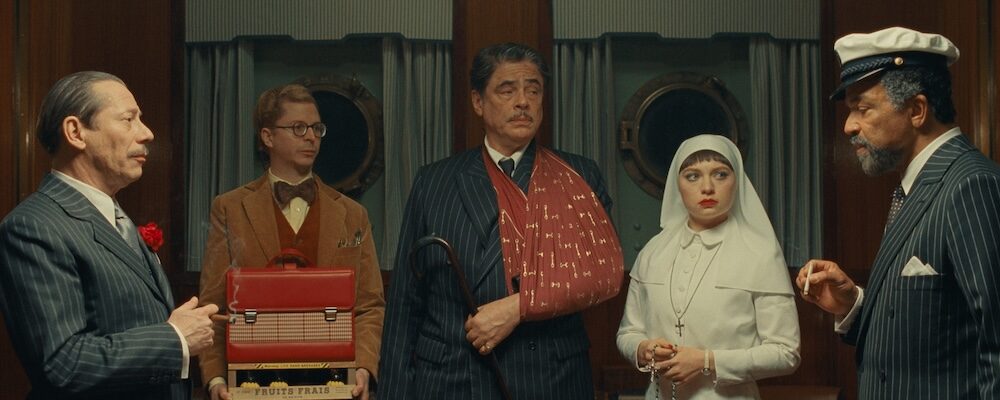‘The Phoenician Scheme’: Benicio Del Toro Is Wes Anderson’s Best Father Figure in Years
Sandra Miska
Fathers and father figures are almost always at the center of Wes Anderson’s films and “The Phoenician Scheme” is no exception. This time, Benicio Del Toro wows as our imperfect specimen of fatherhood, a wealthy industrialist and arms dealer named Anatole “Zsa-Zsa” Korda. In 1950, after surviving another one of the creative assassination attempts that keep coming his way, he decides to make his eldest child and only daughter, novice nun Liesl (Mia Threapleton), his heir, but on a trial basis, of course. A lot of action, absurdity, and even spiritual reflection ensues as the pair trot the globe in order to put in place his plans for the fictional country of Phoenicia.
In addition to Liesl, Zsa-Zsa has nine sons, and thus far has not taken an active interest in any of them. So it comes as a surprise to Liesl when he pulls her away from the convent he dumped her at as a child right before she is about to take her vows. Naturally, she is hesitant, as she has other reasons to be weary of her father. There is a shadiness about him, and violence and death always seem to follow him. All three of his wives have died under suspicious circumstances, including Liesl’s mother. Anderson most likely had tycoons of yesteryear, like Aristotle Onassis, in mind when he thought up Zsa-Zsa, but one cannot help but conjure up more modern cads like Elon Musk when watching him.
Zsa-Zsa’s actual scheme is not easy to follow, but to be truthful, it is not really what this film is about, despite the title. The important thing is that, in true Anderson fashion, he comes in contact with a colorful cast of characters, including one Prince Farouk (Riz Ahmed), with whom he persuades to join him in a high-stakes basketball match between two other associates played by Tom Hanks and Bryan Cranston, despite the young royal never having played the game. We also meet Marty (Jeffrey Wright), a sharp American investor, and Hilda (Scarlett Johansson), Zsa-Zsa’s distant cousin to whom he proposes in the hopes of an old-fashioned merging of assets. The final boss is Zsa-Zsa’s own brother, Nubar (Benedict Cumberbatch), a maniac who is also out to kill Zsa-Zsa.
But the most amusing supporting character is Bjorn (Michael Cera), a Norwegian entomologist Zsa-Zsa has hired to be his personal tutor. A highlight of “The Phoenician Scheme” is Bjorn’s budding friendship with Liesl, as his silliness compliments her more austere personality. Cera eventually gets the film’s biggest laugh when Bjorn reveals a major secret. Indeed, the sheer talent Anderson attracts becomes more and more impressive with each film, and newcomer Threapleton holds her own against her co-stars. Threapleton, the daughter of Kate Winslet, has a different acting style than her mother, but displays just as much promise as Winslet did at a young age, and fits in well in Andersonland.
Spirituality is front and center in “The Phoenician Scheme.” After each near-death experience Zsa-Zsa encounters, which includes a plane crash, being shot at, and some quicksand, he has a vision of the afterlife, which causes him to contemplate his mortal life. And, yes, God is exactly who you would think he is here. As for Liesl, she learns to loosen up a bit outside of the confines of the convent, but remains steadfast in her faith. Her solemnity and earnestness have an effect on her father, which lead to some well-earned emotions in the third act. Zsa-Zsa’s redemption arc and relationship with his daughter feels like a return to form for Anderson. We all wax lyrical about the richness of Anderson’s meticulously crafted production designs and the nostalgic and whimsical elements of his films, but at the end of the day, uniquely framing relationships and the human condition is what he is really about and what makes him such an enduring filmmaker.
“The Phoenician Scheme” releases May 30 in New York and Los Angeles, June 6 in theaters nationwide.

